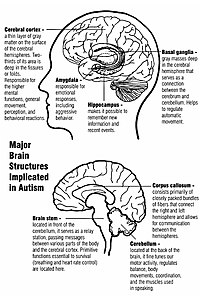
Photo from wikipedia
Adaptive functioning is lower in many autistic individuals to a greater extent than would be expected based on IQ. However, the clinical features associated with these difficulties are less well… Click to show full abstract
Adaptive functioning is lower in many autistic individuals to a greater extent than would be expected based on IQ. However, the clinical features associated with these difficulties are less well understood. This study examines longitudinal and contemporaneous associations of adaptive functioning in autistic youth across a wide ability range. Parent‐reported autism symptoms, co‐occurring emotional, behavioral and attention deficit hyperactivity disorder (ADHD) symptoms, and IQ were assessed in early childhood (M age 7 years; T1) and 6 years later in adolescence (M age 13 years; T2) in 179 autistic youth. Adaptive functioning was assessed at T2. Structural equation modeling estimated pathways to adaptive functioning from autism, and psychiatric symptoms at T1 and T2, testing whether associations were driven by continuity of behaviors from T1 to T2 or their contemporaneous effect at T2, or both, controlling for T1 IQ. Lower adaptive functioning at T2 was associated with higher T1 and T2 ADHD symptoms (β = −0.14, and β = −0.21) but not behavioral nor emotional symptoms at either timepoint. Lower adaptive functioning at T2 was also associated with lower T1 IQ (β = 0.43) and higher social communication symptoms (β = −0.37) at T2 but not T1, but the relationship with ADHD symptoms remained. Paths were not moderated by sex or IQ. Increased symptoms of ADHD, both in early childhood and contemporaneously, were associated with reduced adaptive functioning in adolescence. Co‐occurring ADHD may be a modifiable risk factor for adaptive function impairments and should be routinely assessed and when present evidence‐based treatments initiated which may benefit adaptive functioning outcomes.
Journal Title: Autism Research
Year Published: 2022
Link to full text (if available)
Share on Social Media: Sign Up to like & get
recommendations!